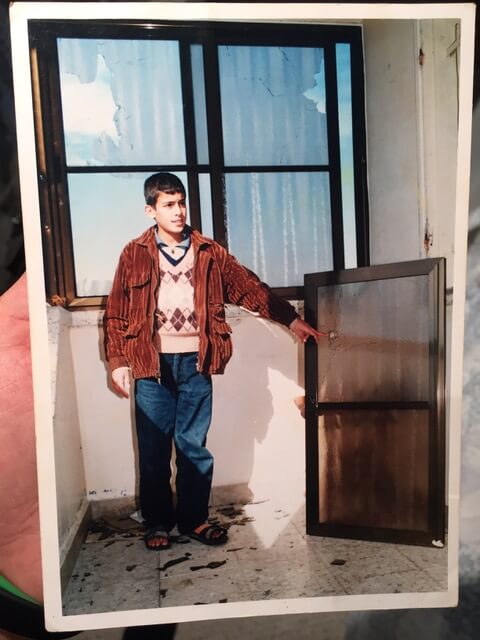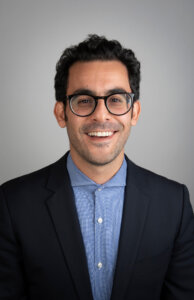Israeli soldiers occupied my home for years. 75 years in, have the protesters forgotten us in Gaza?
I can’t help but support Israelis protesting their own government, but the justice system they’re fighting for failed my people

Graphic by Angelie Zaslavsky
As a Palestinian American from Gaza, I have watched recent demonstrations in Israel with many emotions. Now even the term “Day of Resistance” has taken on a new meaning.
To someone like me, “Day of Resistance” always meant young Palestinians protesting Israel’s military policies in the West Bank, East Jerusalem and Gaza. Almost always, the Israeli Defense Forces and Border Police arrested scores of Palestinians (oftentimes children) using a controversial administrative detention policy under which a 16-year-old can be held in prison for an unspecified amount of time. Many were tear-gassed, and others shot, wounded, and in many cases, killed.
Recent “Days of Resistance,” however, were not led by Palestinians but by Israeli Jewish citizens protesting Prime Minister Benjamin Netanyahu and his far-right governing coalition’s attempt to neuter the Supreme Court in order to enhance their own power. I watched thousands of Israelis take to the streets over the last few months, blocking intersections and highways. I witnessed police on horses violently pushing back marchers, protesters fleeing from water cannons and police firing stun grenades into crowds. The scenes were quite chaotic and ignited a wave of paradoxical emotions in me, certainly, and likely in many Palestinians.
After Palestinians have spent decades trying to obtain equal rights, I feel conflicted about Jewish Israelis protesting out of fear for their democracy and human rights. On the one hand, I support equal rights and fair representation, but my sense tells me that they are protesting to protect their rights only.
For someone like me, who grew up under Israeli occupation, the mass demonstrations are riveting to watch, as the right to protest by Palestinians is almost non-existent. The Israeli justice system not only provided legal cover to the soldiers who occupied our home in Gaza from 2000 to 2005, but denied my father justice every time he went to an Israeli court to try and remove them. It continues to deny my people at every turn.

When Palestinians protest, they are arrested and often shot and killed, even if they do not pose any immediate danger to an IDF soldier or policeman. This has been the way of life for decades, with Israel’s judicial system often providing legal protection for the violent suppression of peaceful Palestinian protest.
When Israel occupied the West Bank and Gaza on June 7, 1967, the Israeli army issued Military Order 101, which criminalizes participation in a gathering of more than 10 people without a permit on an issue “that could be construed as political,” punishable by a sentence of up to 10 years. Israel also permitted the application of a British Mandate law — the Defense (Emergency) Regulations of 1945 — in August of 1976 to further quell Palestinian resistance by prohibiting groups that advocate for the “exciting of disaffection” against the state, including the publishing of material “having a political significance” or displaying “flags or political symbols” without army approval. More than 52 years later, the Israeli army continues to prosecute and imprison Palestinians under these acts.
Still, a part of me, I suppose that is the human part, could not help but sympathize with those Israelis protesting. Moreover, that human part made me want them to succeed. I have grown used to watching as Israel and its Western allies accuse Palestinian demonstrators of being violent, even when they are not, and Palestinian teenagers are repeatedly labeled as terrorists. Now, the Netanyahus and Ben-Gvirs of the world are accusing Israeli protests of being funded by foreign elements, radical leftists and self-hating Jews with “radical” demands like equality, freedom and justice.
What feels different this time is that the Israeli policies Palestinians have protested for years are about to also be applied to Jews. Palestinians have protested Israeli policies for decades, especially those initiated by the far-right parties, and no one, especially not the Israeli public, paid attention. In a way, this time, Israelis are getting a taste of their own medicine, a glimpse into a world without civil rights and where politicians act with impunity.
I moved to the U.S. when I was 16 to attend high school in Utah, and finally became a citizen in 2019, barely a year before George Floyd was murdered. I could not help but get involved in the demonstrations that were sparked after his killing during the summer of 2020. When stun grenades were fired to disperse protesters at St. John’s Church in Washington, D.C., on June 1, 2020, I was there. I did not run away but remained transfixed. It reminded me of the time an IDF smoke grenade landed at my feet near my house in Der-El-Balah in Gaza at the outbreak of the Second Intifada, across the street from the former settlement of Kfar Darom.
My parents were adamant about nonviolence as a form of resistance. They taught my siblings and me that one can also protest by getting high grades in school in order to have a successful career and the ability to truly help one’s people. Many choices ran through my mind as I watched the smoke billow from the ground in front of me. I worried my father would see me if I picked it up, as the protest was very close to our house. But in that moment, I couldn’t avoid it sitting at my feet, nor could I run away from it. Something in my heart told me it should never have landed at my feet or been fired toward me in the first place.

I picked it up and handed it over to a slightly older Palestinian who wore gloves. He took it from me and threw it back at the soldiers who were well-protected in their watchtower. The smoke crushed my lungs and squeezed every possible tear out of my eyes. I went home and discreetly washed up so that neither my mother nor father could see my red face or red eyes.
The memory of my stinging eyes and lungs was crystal clear as I watched fellow Americans run from our own police in the George Floyd protests. I somehow felt normal witnessing this because I understood that Palestinians were not alone in demanding justice and equality.
So, like millions of Palestinians, I feel conflicted about recent protests in Israel. I can’t help but support Israelis protesting their own government even though I understood that the justice system they were trying to preserve failed then, and now, to protect my family and my people.
It failed to stop IDF soldiers from occupying my family’s home for five years. It failed to prevent the demolition of my father’s greenhouses. It failed to protect my father and brother from being shot and injured, my mother from being intimidated and me from being shot in the spine with an M-16 when I was 15 years old. The Israeli soldiers harmed my family because my peace-loving father refused to flee his home and hand it over to the soldiers, and the judicial system that Israelis are now so desperate to save only aided in perpetrating that harm.
Yet after witnessing the protests in the United States against police brutality after George Floyd’s murder and seeing the massive demonstrations in Israel now, I cannot help but feel connected to Israeli Jews’ struggle against state power. Even after all that my family and my people have suffered, the fight against injustice is one that inexorably unifies us all.
I do understand now, however, despite my mixed feelings, that justice, democracy, and freedom cannot be bought or bestowed. They must be fought for by people standing together, and right now, that includes the Israelis.
To contact the author, email [email protected].
















